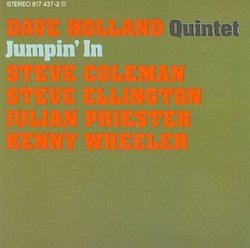Roots
Michael Hardin | South Duxbury, Vermont United States | 12/11/2006
(4 out of 5 stars)
"Bassist Dave Holland is one of the most prominent figures on the jazz scene today, leading a quintet many consider the best in the business, and more recently organizing a big band whose music is quite unlike any big band in the history of jazz. Those who really dig the music of the big band will be especially interested in this particular album, for it contains the original versions of two (actually two and a half) of the tunes on the big band's first recording, "What Goes Around."
This album, recorded in 1984, features a lesser-known edition of the Dave Holland Quintet, lesser-known perhaps only because of how huge his current quintet is on the jazz scene. This group consists of veteran Kenny Wheeler on trumpet and flugelhorn, Steve Coleman on alto saxophone and flute, Julian Priester on trombone, and Steve Ellington on drums, in addition to Holland's bass. The pianoless instrumentation leads to a much more open sound, relying more on Holland's powerful bass to anchor the harmonic structure. The group concept here is a lot like that of Ornette Coleman's early groups, and the instrumentation contributes to this sound. The title track especially sounds like one of Ornette Coleman's sunny, lopsided anthems which is extremely consonant only to dissolve into free playing. But other tunes begin to hint at Dave's individual sound, especially the tunes he later arranged for the big band. "First Snow" is done beautifully here in minimalistic three horn arrangement, and I think I like Wheeler's reading of the melody even better than Sipagian's on "What Goes Around." I had to check the track listing on "New One," since the melody is the same as the introduction to "The Razor's Edge" big band arrangement. I had no idea Dave had combined two of his tunes to produce that arrangement. The third big band tune present in its first version is "Shadow Dance." But unlike "First Snow," this version pales in comparison to the high-energy big band version. That big band arrangement was a staple of my high school jazz band last year, and it helped us win our division at the Berklee High School Jazz Festival, so the big band version holds a special place in my heart. The rest of the tunes continue in the Ornette Coleman vein, in solo approach if not in composition structure. Of particular interest is "You I Love," which seems like it's almost a parody of jazz standards; the melody is a lot like a standard but oddly angular because of the unorthodox harmonic approach and horn harmonies.
I enjoy this album for what it is, but mostly as an interesting look at where Dave's tunes came from. It took him a while to tighten his group concept and find the right musicians to create the original sound his music has today. This album is a lot looser, to mixed effect, and the horn players aren't as good at interacting as Chris Potter and Robin Eubanks in today's Dave Holland Quintet, but the material is interesting and the performances are a little more "out" than Holland's music now. I would actually recommend "Prime Directive" as a good starting place for Holland's music, but for existing fans, this is a really interesting album to hear. It is by no means casual listening and I wouldn't recommend it to non-jazz fans, but I would recommend it to fans of Ornette Coleman or Eric Dolphy for its interesting collective improv approach."


 Track Listings (7) - Disc #1
Track Listings (7) - Disc #1